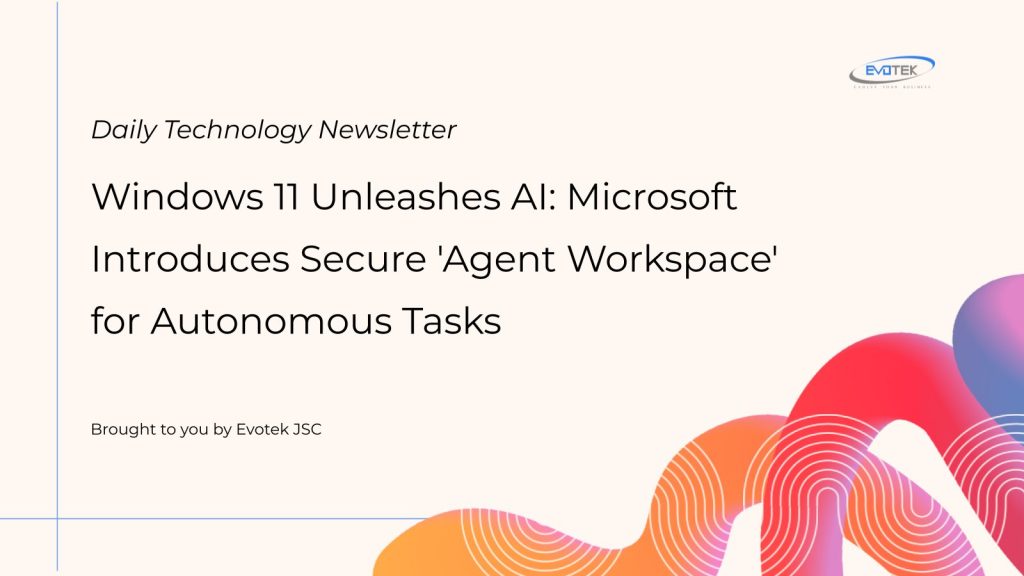Microsoft is charting a bold new course for Windows 11, transforming it into an “agentic operating system” where artificial intelligence takes center stage. The company has officially detailed how this vision will come to life with the introduction of a groundbreaking “agent workspace” feature, designed to empower AI agents to perform tasks securely and efficiently on your behalf.
This innovative step is part of Microsoft’s commitment to an AI-native future for Windows, aiming to enhance productivity and security for both individuals and enterprises. The “agent workspace” is currently rolling out in a private developer preview for Windows Insiders, reflecting a phased approach to gather feedback and bolster foundational security before wider availability.
What is an Agent Workspace?
An agent workspace is essentially a dedicated, contained environment within Windows 11. Here, you can grant AI agents access to specific applications and files, enabling them to execute tasks in the background while you continue to use your device without interruption. This functionality relies on a new ‘experimental agentic features’ toggle that users must explicitly enable, ensuring full control.
Key features of these agent workspaces include:
- Dedicated Accounts: Each agent operates under its own distinct user account, separate from your personal account. This establishes clear boundaries, allowing for scoped authorization and runtime isolation.
- Parallel Execution: Agents run within their own separate Windows session, complete with a unique desktop environment. This means AI can operate applications concurrently with the human user, similar to a PC with multiple user profiles.
- Lightweight and Secure: Designed for efficiency, these workspaces scale memory and CPU usage based on activity. Microsoft states this setup is more efficient than a full virtual machine like Windows Sandbox, while still delivering strong security isolation and parallel execution.
Microsoft is refining the overall experience and security model to prioritize transparency, safety, and user control, emphasizing that this is an evolving commitment rather than a one-time feature.
Security at the Core of Agentic AI
The integration of agentic AI experiences into Windows 11 is being built with security as a paramount concern. Microsoft has outlined three core security pillars that must be adhered to:
- Non-repudiation: Every action taken by an AI agent is observable and clearly distinguishable from user actions.
- Confidentiality: Agents handling protected user data must meet or exceed existing security and privacy standards.
- Authorization: Users maintain explicit approval over all queries for their data and any actions the agent proposes to take.
Furthermore, Microsoft has established critical security and design principles for all AI agents on Windows:
- Agents are autonomous but susceptible to attack, necessitating robust containment mechanisms.
- Agents must produce tamper-evident audit logs of their activities.
- Supervision means users can review, approve, and monitor multi-step agent plans, with agents explicitly requesting user authorization when necessary.
- Agents must adhere to the principle of least privilege, never exceeding the permissions of the initiating user and only accessing sensitive information in specific, user-authorized contexts.
- Access to an agent should be restricted to its owner, preventing unauthorized system entities from interfering.
- Windows will support agents in upholding Microsoft’s Privacy Statement and Responsible AI Standard, ensuring transparent and trustworthy data processing.
The Future of AI on Windows 11
It is clear that Microsoft is taking the responsibility of introducing agentic AI capabilities very seriously. Developers creating AI apps and services for Windows 11 will be required to follow these stringent guidelines to ensure platform compliance and user safety.
The isolation of AI agent activities within their own secure workspaces is key to maintaining reliability and security. This design prevents AI from running unsupervised or accessing unauthorized data, offering users the ability to easily shut down tasks if needed.
Microsoft has confirmed that Copilot Actions will be among the first AI applications to leverage these experimental agentic capabilities. The framework also opens the door for third-party developers to build their own AI agents, integrating them into apps using the same robust, secure architecture detailed by Microsoft today.

 日本語
日本語 한국어
한국어 Tiếng Việt
Tiếng Việt 简体中文
简体中文